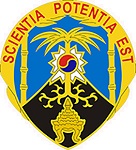
Unit history/lineage
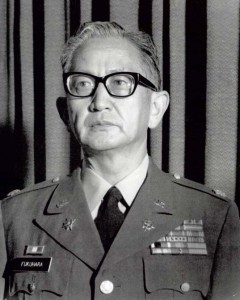
Harry K. Fukuhara
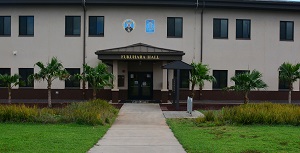



The Headquarters, 500th Military Intelligence Service Group was constituted on June 30, 1952 in the Regular Army and activated on 1 September 1952, in Japan under the Far East Command. The Military Intelligence Service Group, Far East was a temporary organization created to help meet the Army's immediate intelligence requirements and the successor to the Allied Translator and Interpreter Section that existed since 1942.
In 1957, the United States and Japan signed an agreement to drawdown American troop strengths in Japan and relocate the Army's Pacific headquarters from Tokyo to Hawaii. As the U.S. Army Command Reconnaissance Activity absorbed part of the large-scale cut back, the functions of the 500th MI Service Group, along with that of the Intelligence Support Center, Pacific, the successor to the U.S. Army Command Reconnaissance Activity, Far East, and the 500th was inactivated.
On 25 March 1961, the 500th MI Group (Collection) was reactivated at Camp Drake, now Camp Asaka, in Japan with a new mission; this time to carry out all aspects of the HUMINT mission, not just translation and interpretation. For the first time, the U.S. Army had placed a large portion of intelligence responsibilities in the Pacific within a single unit.
Internally, the 500th MI Group was divided into detachments stationed at various locations throughout the Pacific, from Korea, to the Philippines, and to Thailand. These detachments served a dual role of advising and assisting military in intelligence collection as well as engaging in limited collection activities itself.
On 15 December 1965, the headquarters of the 500th MI Corps Group relocated to Ford Island, Hawaii, a move dictated by efforts to reduce expenditures affecting the international balance of payments.
In 1972, the Group relocated to Helemano Military Reservation. It was during this time that the 500th MI Group was recognized for its contributions throughout the Pacific area during the Vietnam War and received the Meritorious Unit Commendation for the periods 1968-1969 and 1972-1974. This was unprecedented at the time for a unit not located within a combat zone to receive such recognition.
The 500th MI Group, like rest of the Army and military intelligence, underwent important changes in the aftermath of the Vietnam War. The first of these was the reassignment from US Army Pacific to the US Army Intelligence Agency on 1 November 1974. By 1976, the Gold flow was not the overriding issue it once was and on 15 July 1976, the unit headquarters was relocated back to Japan. This time to Camp Zama in Kanagawa Prefecture, a former Japanese Imperial Army Academy.
On 1 January 1977, the 500th MI Group was reassigned to the new US Army Intelligence and Security Command (INSCOM). As one of INSCOM's regional military intelligence groups, the 500th would have responsibility for the first time for the entire spectrum of intelligence and counterintelligence functions at Echelons above Corps. To symbolize the breath of its new mission, the 500th MI Group received the distinctive designation Pacific Vanguard� in April 1978.
Throughout this period of its existence, the 500th continued to be recognized for providing excellent products and support to US Army Pacific and its predecessor the US Army Western Command and was awarded the US Army Superior Unit Award (1986-1987).
The growth in status and broadening of its mission was symbolized by its re-designation on 16 October 1987 as the Headquarters and Headquarters Company, 500th Military Intelligence Brigade. Despite major shift in the world of geopolitics in the late 1980's and early 1990's, the 500th elements and personnel continued to be an integral part of INSCOM's growing commitment to US Deployments overseas including the Gulf War and Operation Uphold Democracy.
 |
 |
| The Representation of the Unit Crest: The oriental blue and silver gray represent: MI branch, the sword represent vigilance, the lightning flash rep electronic communication and speed, the globe represents worldwide service and the torch represents knowledge. | Representations of the Unit Insignia: The Mount Fuji rep service in Japan, The palm tree rep service in Hawaii, The red and blue taeguk rep Republic of Korea, The white sun rep Taiwan, The bamboo trees rep Vietnam, The Siamese headdress rep Thailand. Knowledge is Strength.� |
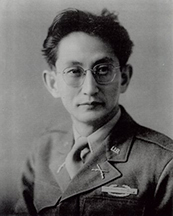 Harry K. Fukuhara, a second-generation Japanese American from Seattle, Washington, moved with his mother back to her hometown of Hiroshima, Japan, when he was 13. He spent the next five years in Japanese schools, learning the culture and language of his ancestors. Repatriated at age 18, he moved to California and obtained an Associate's Degree in June 1941. Six months later, he and approximately 120,000 other Japanese Americans were relocated away from America's west coast and placed in internment camps. Furious, but wanting to prove his loyalty to America, Fukuhara enlisted in the US Army in 1942.
SGT Fukuhara went first to Camp Savage, Minnesota, to learn the duties of a military linguist: interpreter, interrogator, and translator. In May 1943, the 22-year-old was assigned to Australia and then New Guinea as part of the Allied Translator and Interpreter Service (ATIS). He became the leader of a ten-man interrogator/interpreter team. Understanding the Japanese cultural naivet under interrogation, SGT Fukuhara was determined to convince American commanders of the value of capturing Japanese soldiers for intelligence purposes. He and his team had great success in eliciting critical information from Japanese prisoners of war and captured documents. In addition, they prepared surrender leaflets, participated in missions to persuade Japanese soldiers to surrender, reconnaissance missions with native scouts, and as members of US Navy PT boat patrols. For his accomplishments in the field, Fukuhara was promoted through the ranks to Master Sergeant and awarded numerous Bronze Star medals. On 10 August 1945, he received a battlefield commission to Second Lieutenant.
Harry K. Fukuhara, a second-generation Japanese American from Seattle, Washington, moved with his mother back to her hometown of Hiroshima, Japan, when he was 13. He spent the next five years in Japanese schools, learning the culture and language of his ancestors. Repatriated at age 18, he moved to California and obtained an Associate's Degree in June 1941. Six months later, he and approximately 120,000 other Japanese Americans were relocated away from America's west coast and placed in internment camps. Furious, but wanting to prove his loyalty to America, Fukuhara enlisted in the US Army in 1942.
SGT Fukuhara went first to Camp Savage, Minnesota, to learn the duties of a military linguist: interpreter, interrogator, and translator. In May 1943, the 22-year-old was assigned to Australia and then New Guinea as part of the Allied Translator and Interpreter Service (ATIS). He became the leader of a ten-man interrogator/interpreter team. Understanding the Japanese cultural naivet under interrogation, SGT Fukuhara was determined to convince American commanders of the value of capturing Japanese soldiers for intelligence purposes. He and his team had great success in eliciting critical information from Japanese prisoners of war and captured documents. In addition, they prepared surrender leaflets, participated in missions to persuade Japanese soldiers to surrender, reconnaissance missions with native scouts, and as members of US Navy PT boat patrols. For his accomplishments in the field, Fukuhara was promoted through the ranks to Master Sergeant and awarded numerous Bronze Star medals. On 10 August 1945, he received a battlefield commission to Second Lieutenant. 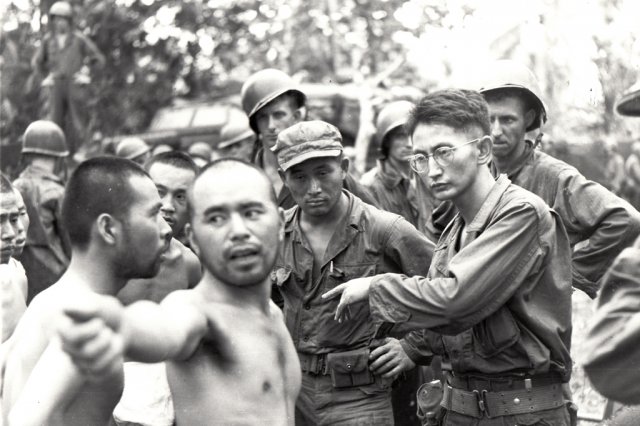 During the occupation of Japan, Fukuhara initially served as an Interpreter/Translator and then became the Operations Officer and Commander of the Counterintelligence Field Office, Osaka, Japan, until 1952. After an intelligence assignment in San Francisco, he returned to Japan as the Chief, Counterintelligence Investigative and Liaison Detachment, Tokyo, from 1959 to 1964. From 1964 to 1966, he was the Deputy Commander of the 109th Intelligence Corps Group, Fort Meade, Maryland. He returned again to Japan to command the CI and Collection Detachment in Tokyo from 1966 to 1970. When he retired from the Army in 1971, he was serving as the Military Governor of the Yaeyama Islands Group. After his retirement, he remained active in intelligence within the Military Intelligence Excepted Career Program. He served in this capacity until 1991, fostering American/Japanese cooperation through his extensive personal contacts.
COL Fukuhara's military awards include the Bronze Star (2 Oak Leaf Clusters), the Legion of Merit, the Meritorious Service Medal, the Army Commendation Medal, and the Combat Infantryman's Badge. He also received the National Intelligence Distinguished Service Medal, presented by the Director of the Central Intelligence Agency in 1987, and the Department of the Army Decoration for Exceptional Civilian Service, presented by the Secretary of the Army in 1987.
COL Fukuhara was inducted into the MI Hall of Fame in 1988 and selected as a Distinguished Member of the MI Corps in 1993. COL Fukuhara passed away on 8 April 2015.
Back to top
During the occupation of Japan, Fukuhara initially served as an Interpreter/Translator and then became the Operations Officer and Commander of the Counterintelligence Field Office, Osaka, Japan, until 1952. After an intelligence assignment in San Francisco, he returned to Japan as the Chief, Counterintelligence Investigative and Liaison Detachment, Tokyo, from 1959 to 1964. From 1964 to 1966, he was the Deputy Commander of the 109th Intelligence Corps Group, Fort Meade, Maryland. He returned again to Japan to command the CI and Collection Detachment in Tokyo from 1966 to 1970. When he retired from the Army in 1971, he was serving as the Military Governor of the Yaeyama Islands Group. After his retirement, he remained active in intelligence within the Military Intelligence Excepted Career Program. He served in this capacity until 1991, fostering American/Japanese cooperation through his extensive personal contacts.
COL Fukuhara's military awards include the Bronze Star (2 Oak Leaf Clusters), the Legion of Merit, the Meritorious Service Medal, the Army Commendation Medal, and the Combat Infantryman's Badge. He also received the National Intelligence Distinguished Service Medal, presented by the Director of the Central Intelligence Agency in 1987, and the Department of the Army Decoration for Exceptional Civilian Service, presented by the Secretary of the Army in 1987.
COL Fukuhara was inducted into the MI Hall of Fame in 1988 and selected as a Distinguished Member of the MI Corps in 1993. COL Fukuhara passed away on 8 April 2015.
Back to top
SCHOFIELD BARRACKS The 500th Military Intelligence Brigade dedicated the new brigade headquarters building to the late Col. Harry K. Fukuhara, in a ceremony held on Dec. 4, 2015.
Fukuhara, a second generation Japanese-American, served 48 years in active military and civil service for the U.S. Army.
He was recognized for his career contributions with the induction into the U.S. Army Military Intelligence Hall of Fame in 1988 and was given the honor of Distinguished Member of the Military Intelligence Corp in 1993.
In 1990, Fukuhara received the third Order of the Rising Sun, Gold Rays with Neck Ribbon from the Emperor of Japan and the President's Award for Distinguished Federal Civilian Service.
Expected in attendance are son Brian Fukuhara; two daughters, Shary Fukuhara and Pamela Tsuzaki; grandson Sgt. Grant Fukuhara Hashimoto, JFK Special Warfare Center and School, Fort Bragg; and state representatives Beth Fukumoto-Chang and Bertrand Kobayashi.
The new facility allows for the consolidation of six facilities into one, providing the opportunity to consolidate the Intelligence and Security Command on island military intelligence assets while supporting the senior commander's growth initiative.
More than 250 Soldiers, Department of the Army civilians and contractors are able to work in the new building, doubling the work capacity of the brigade's old facility.